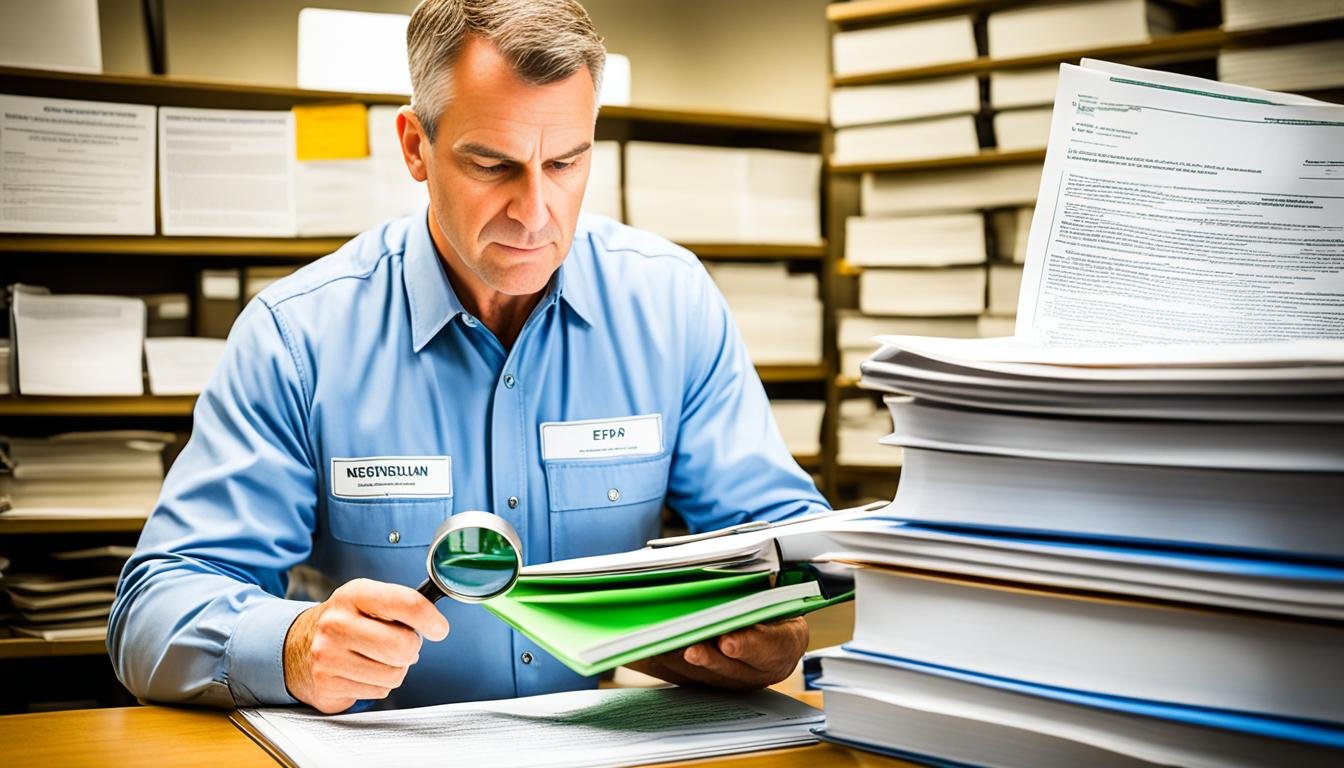EPA Regulations: What SMEs Need to Know
Small and medium-sized enterprises (SMEs) are key to the U.S. economy. They make up over 99% of the businesses here. These firms employ many people and help grow the economy through job creation.
But understanding and following EPA regulations is tricky for SMEs. EPA rules cover emissions, waste, and how companies use energy. Small businesses often find it hard to keep up because they don’t have a lot of resources for this.
The Science Based Targets initiative (SBTi) came up with a way to help. It offers a simpler method for SMEs to set environmental goals. This makes it easier for them to show they’re working to cut emissions and meet environmental rules.
Key Takeaways:
- SMEs make up over 99% of U.S. businesses.
- EPA rules cover emissions, waste, and how companies use energy.
- The SBTi introduced a simpler way for SMEs to set eco-friendly goals.
- This approach helps SMEs prove they’re cutting emissions and following eco-laws.
- It’s vital for SMEs to follow EPA rules to help the environment and meet their legal duties.
Understanding the Streamlined Route for SMEs
The streamlined route for SMEs makes it easy to set science-based targets. It ensures they follow EPA rules. Unlike big firms, SMEs don’t have to set goals for all scope 3 emissions. But, they must measure and cut these emissions. This easier method lets SMEs show they care about the environment.
SMEs can quickly set science-based targets with a special form. They pick from ready options, skipping the hard part of checking if their targets are right. This method is simple and fast for small businesses.
By setting science-based targets, SMEs join the fight against climate change. They line up their efforts with what science says we need to do. This way, they help the planet and encourage eco-friendly practices.
Benefits of the Streamlined Route for SMEs:
- Efficiency: SMEs can set targets quickly and save time by avoiding a long checkup.
- Accessibility: The form’s ready options help SMEs set their targets with ease.
- Alignment with EPA Regulations: SMEs stay on the right side of the law by working on cutting their scope 3 emissions.
- Sustainability: With sound targets, SMEs do their part in the global push to cut down greenhouse gases.
SMEs are key to keeping the environment healthy. The streamlined approach lets them show they are eco-friendly. By following strict rules and using science-based targets, they help the Earth for the next generations.
Benefits of Implementing an Environmental Management System (EMS)
Environmental Management System (EMS) helps small businesses in many ways. It provides a plan to lessen harm to the environment. It also makes operations run smoother. This system helps meet rules without spending too much, while encouraging green habits.
Setting up an EMS shows a commitment to protect the environment. It means following EPA rules and using eco-friendly methods in everyday work. This effort wins trust from customers, workers, and partners.
An EMS lets companies cut down on their environmental effect and use fewer resources. By checking on performance and fixing what’s not working, they become more efficient and save money. Using green methods and tech helps SMEs produce less waste, save on energy, and use resources better.
Sticking to EPA rules is key for small businesses in managing the environment. An EMS helps them follow these rules correctly. It keeps businesses ready for checks and avoids fines.
So, an Environmental Management System offers a lot to small businesses. It makes them cleaner, more efficient, and better at following rules. By getting an EMS, businesses can do their part for the environment. And they look smart and caring, ready to build a better future.
Key EPA Regulations for SMEs to Consider
SMEs need to know about many important EPA regulations. They touch on various environmental areas. These rules make sure SMEs follow steps to protect the environment.
Environmental Permitting Regulations
Environmental permits are key for SMEs doing activities like waste disposal. These businesses must get permits to meet the rules for environmental protection. Without these permits, SMEs risk breaking the law.
Waste Regulations
Every business has to follow waste rules. SMEs must manage their waste properly, recycling and getting rid of it right. Doing this can lower their harm to the environment and keep them out of trouble.
Packaging Waste Regulations
Businesses putting packaging on the market in the UK must follow these rules. SMEs need to handle their packaging waste well, recycling and recovering it. This helps the environment and supports the circular economy.
Energy Performance of Buildings Regulations
These rules are for all public and commercial buildings in England and Wales. SMEs owning or using these buildings have to follow them. By using energy better, SMEs can cut their carbon footprints and save money.
Wildlife and Countryside Act
The Wildlife and Countryside Act protects UK wildlife. SMEs must watch how their work affects wildlife and nature. By doing so, businesses help keep wildlife safe and their habitats protected.
Water Resources Act
This Act manages how water is used in the UK. SMEs need to use water wisely. Doing so helps keep water ecosystems healthy and supports a sustainable future.
UK Emission Trading Scheme
This scheme helps cut greenhouse gas emissions. SMEs with high emissions might need to join. Through this scheme, SMEs show they’re working towards a cleaner, low-carbon economy.
Companies Act 2006 Emission Reporting
The Companies Act 2006 needs certain companies to report on their emissions and energy use. SMEs in this group must measure and share their impact. This step shows their care for the environment and acting sustainably.
The Key EPA Regulations for SMEs
| Regulations | Requirements |
|---|---|
| Environmental Permitting Regulations | Obtain necessary environmental permits for activities with significant environmental impacts. |
| Waste Regulations | Implement proper waste management practices for waste collection, recycling, and disposal. |
| Packaging Waste Regulations | Comply with requirements for the collection, recycling, and recovery of packaging waste. |
| Energy Performance of Buildings Regulations | Ensure energy-efficient appliances and lighting installations in commercial buildings. |
| Wildlife and Countryside Act | Undertake measures to minimize impact on wildlife habitats and protected species. |
| Water Resources Act | Implement efficient water management practices and minimize water usage. |
| UK Emission Trading Scheme | Manage greenhouse gas emissions through buying and selling emission allowances. |
| Companies Act 2006 Emission Reporting | Measure and report greenhouse gas emissions and energy consumption. |
Compliance with Environmental Permitting Regulations
It’s vital to follow environmental permitting regulations to manage activities that affect the environment. These rules cover waste disposal, water discharge, air emissions, and noise pollution. For small and medium-sized businesses (SMEs) to legally operate and protect nature, sticking to these regulations is a must.
SMEs needing an environmental permit should look to the Environment Agency and Natural Resources Wales for guidance. These bodies enforce the rules and check that companies meet their environmental duties. With a permit, SMEs show they’re serious about being green and supporting a clean earth.
The Environment Agency ensures England’s SMEs meet tough environmental standards to safeguard nature and health. Companies in England need to obey these rules to avoid fines or other legal trouble.
In Wales, Natural Resources Wales watches over environmental permitting compliance. They work to use natural resources wisely, protect the environment, and manage land and water properly. SMEs in Wales must get the right permits and follow Natural Resources Wales’ guidelines.
Benefits of Environmental Permitting Compliance for SMEs:
- Environmental Responsibility: Following the rules shows SMEs care about the environment and operate in a sustainable way.
- Legal Compliance: Sticking to regulations keeps SMEs out of legal problems and fines.
- Environmental Impact Mitigation: The rules help SMEs lower their harmful effects on the environment.
- Positive Reputation: Being green attracts customers and partners who care about the environment.
For SMEs, environmental permit compliance is key to protecting our planet, following the law, and supporting a green future. By collaborating with the Environment Agency and Natural Resources Wales, SMEs help keep our environment healthy for the next generations.
| Key Points | Environmental Permitting Regulations for SMEs |
|---|---|
| Licensing Authority | Environment Agency (England) Natural Resources Wales (Wales) |
| Regulated Activities | Waste disposal Water discharge Air emissions Noise pollution |
| Compliance Obligations | Obtaining environmental permits Adhering to permit conditions Ensuring proper waste management Minimizing environmental impacts |
| Benefits | Environmental responsibility Legal compliance Environmental impact mitigation Positive reputation |
Waste Management Regulations for SMEs
Handling waste properly is crucial for running a responsible business. Regulations ensure businesses safely manage, collect, recycle, and dispose of waste. For small and medium-sized enterprises (SMEs), following these rules helps them be good for the earth. It also avoids fines and other tough actions.
SMEs follow these waste rules to stop pollution and lessen their environmental harm. They also help to manage waste in ways that are good for the planet. These rules cover everything from sorting waste to its final disposal.
When SMEs stick to the waste rules, they can do a lot:
- Protect the environment: By managing waste well, they stop dangerous chemicals and waste from harming our planet. This keeps our environment and natural habitats safe.
- Promote sustainability: Following the rules means SMEs can work towards recycling and reusing more. They help keep materials in use longer and cut waste.
- Enhance reputation: Being good at waste management makes others see SMEs in a positive light. Customers and the community like businesses that care for the environment.
The Environment Agency and others offer guides and help for keeping up with waste laws. It’s key for SMEs to stay informed about any rule changes.
SME Waste Management Checklist
Here’s a simple guide to help SMEs manage their waste as the rules say:
| Steps | Actions |
|---|---|
| 1 | Figure out what kind of waste you have and how to sort them. |
| 2 | Put in place processes for handling waste, like how to store and label it. |
| 3 | Pick the right way to get rid of waste, like using licensed contractors. |
| 4 | Keep track of your waste work, including paperwork for moving or getting rid of waste when needed. |
| 5 | Keep an eye on how much waste you put out, how much gets recycled, and other measures to make things better. |
| 6 | Regularly check and fix your waste management plans. |
Using this guide and doing good waste management helps SMEs meet all the waste laws. It also makes them less harmful to the earth and more sustainable.
Importance of Packaging Waste Regulations for SMEs
Packaging waste rules are key for making sure businesses in the UK package responsibly. These rules demand that packaging waste be collected and dealt with properly. The goal is to lessen its harm on the environment and encourage green methods.
Following these rules is a must for small and medium-sized enterprises (SMEs). It shows they take the environment seriously. By doing their part, SMEs help their industry reach green goals. They also help keep the planet safe for those who come after us.
“Complying with packaging waste regulations is essential for SMEs to minimize their ecological footprint and ensure efficient resource utilization.”
SMEs need to ensure their packing materials are eco-friendly from start to finish. This means thinking about things like if they can be recycled or reused. Choosing green materials is a plus. It not only helps the earth but can also make customers trust and like your brand more.
Benefits of Compliance with Packaging Waste Regulations
Fulfilling packaging waste standards has many upsides for SMEs:
- Environmental Impact Reduction: It helps cut the bad effects of packaging waste on our planet. This includes saving natural resources and lowering pollution.
- Resource Optimization: It pushes SMEs to use packaging materials more wisely. This means they throw away less and use resources better.
- Legal Compliance: It keeps SMEs from getting in trouble with the law. By following these rules, they avoid fines or bad publicity.
- Brand Reputation: It can make an SME look good by showing they care about the planet. This could attract customers who value green practices.
- Operational Efficiency: Doing packaging right can make business processes smoother. This leads to saving money and doing better overall.
When SMEs focus on meeting packaging standards, they show they’re all about sustainable and green business. This benefits everyone, including the communities they are part of.
Comparison of Packaging Waste Regulations for SMEs
| Regulation | Requirements | Enforcement Authorities |
|---|---|---|
| Packaging Waste Regulations 2007 | – Meeting packaging recycling targets – Reporting on packaging waste quantities – Registering with a compliance scheme |
Environment Agency (England) Natural Resources Body for Wales (Wales) |
| Producer Responsibility Obligations (Packaging Waste) Regulations | – Joining a compliance scheme – Meeting packaging recycling and recovery targets – Reporting and record-keeping obligations |
Environment Agency (England) Natural Resources Body for Wales (Wales) |
It’s crucial for SMEs to follow packaging waste guidelines. By doing so, they support a greener and circular economy. They help cut down on damage to the environment, save resources, and work towards a healthier future.
Ensuring Energy Efficiency with Energy Performance of Buildings Regulations
Energy performance of buildings regulations help SMEs be more energy efficient. They apply to all commercial and public buildings in England and Wales. These rules make sure businesses run in an eco-friendly way.
These regulations tell SMEs to meet specific energy efficiency standards. Installing energy-efficient appliances and lighting is a big part of it. This helps cut down on energy use and carbon emissions.
SMEs should follow these rules to save on energy costs and meet their legal duties. This also helps them do better for the environment.
Importance of Energy Efficiency for SMEs
Energy efficiency is key for SMEs. It helps them use resources better and spend less on operations. Setting up energy-saving ways allows SMEs to lower their carbon footprint for a greener future.
“Investing in energy efficiency helps the environment and saves money for SMEs. Lower energy use means smaller bills and bigger profits.”
Benefits of Complying with Energy Performance of Buildings Regulations
Meeting these rules has lots of good points for SMEs. It makes their use of energy better and cuts their environmental harm. This shows they care about the planet and makes them look good.
It also makes workspaces better for employees, making them happier and more productive. Plus, it can make SMEs more attractive because buyers and clients like eco-friendly options.
Energy Efficiency Measures for SMEs
| Energy Efficiency Measure | Description |
|---|---|
| Installation of LED Lighting | Change old lights to LED to save on electricity and maintenance. |
| Improving Insulation | Better building insulation means using less heating and cooling. |
| Upgrading HVAC Systems | New, more efficient HVAC systems can control climate better. |
| Smart Building Automation | Smart systems can use energy better by controlling lights, HVAC, and more. |
| Employee Awareness Programs | Tell staff about saving energy and how they can help conserve it. |
Doing these things can save a lot of energy and make SMEs’ operations more environment- friendly.
Conclusion
Small and medium-sized enterprises, known as SMEs, are key in keeping the environment safe. They can do this by following rules set by the EPA. This lets them protect nature and also keep their business legal.
SMEs achieve this by setting goals based on science and managing their environmental impact. They focus on using resources better and making less waste. By doing these things, SMEs can understand and follow the many rules of the EPA.
When SMEs care about the environment, they do less harm. They make sure they follow the EPA rules to show they are responsible. By sticking to these guidelines, SMEs help shape a future where companies and nature thrive together.
To sum up, SMEs can lead in protecting the environment by adopting EPA rules. Using these rules wisely in their business is a smart move. It helps SMEs lower their impact on nature while working towards a sustainable tomorrow.







